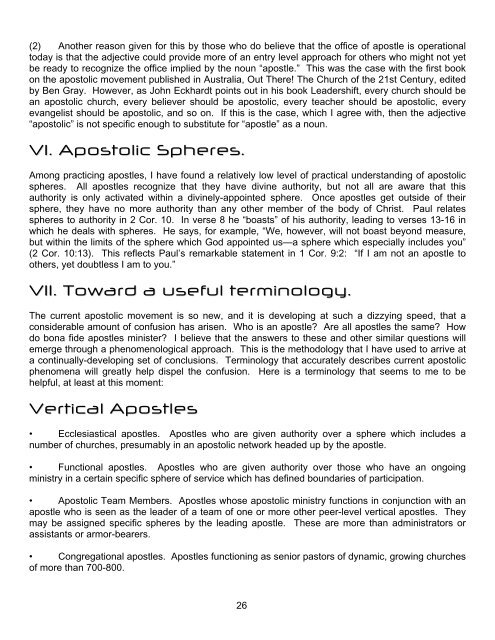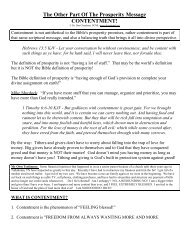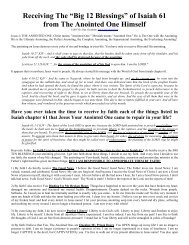Apostolic Alignment - FaithSite.com
Apostolic Alignment - FaithSite.com
Apostolic Alignment - FaithSite.com
Create successful ePaper yourself
Turn your PDF publications into a flip-book with our unique Google optimized e-Paper software.
(2) Another reason given for this by those who do believe that the office of apostle is operational<br />
today is that the adjective could provide more of an entry level approach for others who might not yet<br />
be ready to recognize the office implied by the noun “apostle.” This was the case with the first book<br />
on the apostolic movement published in Australia, Out There! The Church of the 21st Century, edited<br />
by Ben Gray. However, as John Eckhardt points out in his book Leadershift, every church should be<br />
an apostolic church, every believer should be apostolic, every teacher should be apostolic, every<br />
evangelist should be apostolic, and so on. If this is the case, which I agree with, then the adjective<br />
“apostolic” is not specific enough to substitute for “apostle” as a noun.<br />
VI. <strong>Apostolic</strong> Spheres.<br />
Among practicing apostles, I have found a relatively low level of practical understanding of apostolic<br />
spheres. All apostles recognize that they have divine authority, but not all are aware that this<br />
authority is only activated within a divinely-appointed sphere. Once apostles get outside of their<br />
sphere, they have no more authority than any other member of the body of Christ. Paul relates<br />
spheres to authority in 2 Cor. 10. In verse 8 he “boasts” of his authority, leading to verses 13-16 in<br />
which he deals with spheres. He says, for example, “We, however, will not boast beyond measure,<br />
but within the limits of the sphere which God appointed us—a sphere which especially includes you”<br />
(2 Cor. 10:13). This reflects Paul’s remarkable statement in 1 Cor. 9:2: “If I am not an apostle to<br />
others, yet doubtless I am to you.”<br />
VII. Toward a useful terminology.<br />
The current apostolic movement is so new, and it is developing at such a dizzying speed, that a<br />
considerable amount of confusion has arisen. Who is an apostle? Are all apostles the same? How<br />
do bona fide apostles minister? I believe that the answers to these and other similar questions will<br />
emerge through a phenomenological approach. This is the methodology that I have used to arrive at<br />
a continually-developing set of conclusions. Terminology that accurately describes current apostolic<br />
phenomena will greatly help dispel the confusion. Here is a terminology that seems to me to be<br />
helpful, at least at this moment:<br />
Vertical Apostles<br />
• Ecclesiastical apostles. Apostles who are given authority over a sphere which includes a<br />
number of churches, presumably in an apostolic network headed up by the apostle.<br />
• Functional apostles. Apostles who are given authority over those who have an ongoing<br />
ministry in a certain specific sphere of service which has defined boundaries of participation.<br />
• <strong>Apostolic</strong> Team Members. Apostles whose apostolic ministry functions in conjunction with an<br />
apostle who is seen as the leader of a team of one or more other peer-level vertical apostles. They<br />
may be assigned specific spheres by the leading apostle. These are more than administrators or<br />
assistants or armor-bearers.<br />
• Congregational apostles. Apostles functioning as senior pastors of dynamic, growing churches<br />
of more than 700-800.<br />
26






